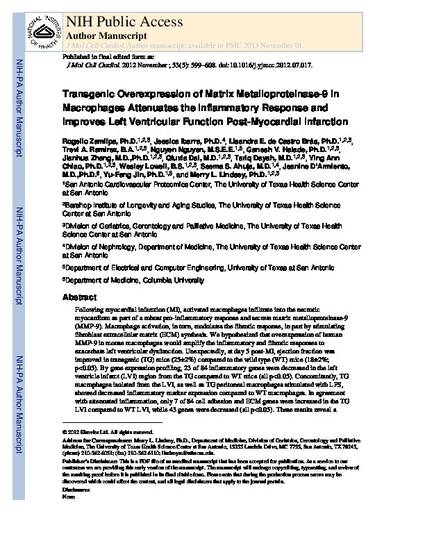
- Cardiac remodeling,
- Extracellular matrix,
- Inflammation,
- Macrophage,
- Matrix metalloproteinase-9,
- Myocardial infarction
Following myocardial infarction (MI), activated macrophages infiltrate into the necrotic myocardium as part of a robust pro-inflammatory response and secrete matrix metalloproteinase-9 (MMP-9). Macrophage activation, in turn, modulates the fibrotic response, in part by stimulating fibroblast extracellular matrix (ECM) synthesis. We hypothesized that overexpression of human MMP-9 in mouse macrophages would amplify the inflammatory and fibrotic responses to exacerbate left ventricular dysfunction. Unexpectedly, at day 5 post-MI, ejection fraction was improved in transgenic (TG) mice (25 ± 2%) compared to the wild type (WT) mice (18 ± 2%; p < 0.05). By gene expression profiling, 23 of 84 inflammatory genes were decreased in the left ventricle infarct (LVI) region from the TG compared to WT mice (all p < 0.05). Concomitantly, TG macrophages isolated from the LVI, as well as TG peritoneal macrophages stimulated with LPS, showed decreased inflammatory marker expression compared to WT macrophages. In agreement with attenuated inflammation, only 7 of 84 cell adhesion and ECM genes were increased in the TG LVI compared to WT LVI, while 43 genes were decreased (all p < 0.05). These results reveal a novel role for macrophage-derived MMP-9 in blunting the inflammatory response and limiting ECM synthesis to improve left ventricular function post-MI.
Journal of Molecular and Cellular Cardiology, v. 53, issue 5, p. 599-608
This article is the post-print author version. Final version available at: https://doi.org/10.1016/j.yjmcc.2012.07.017
Available at: http://works.bepress.com/ganesh-halade/82/